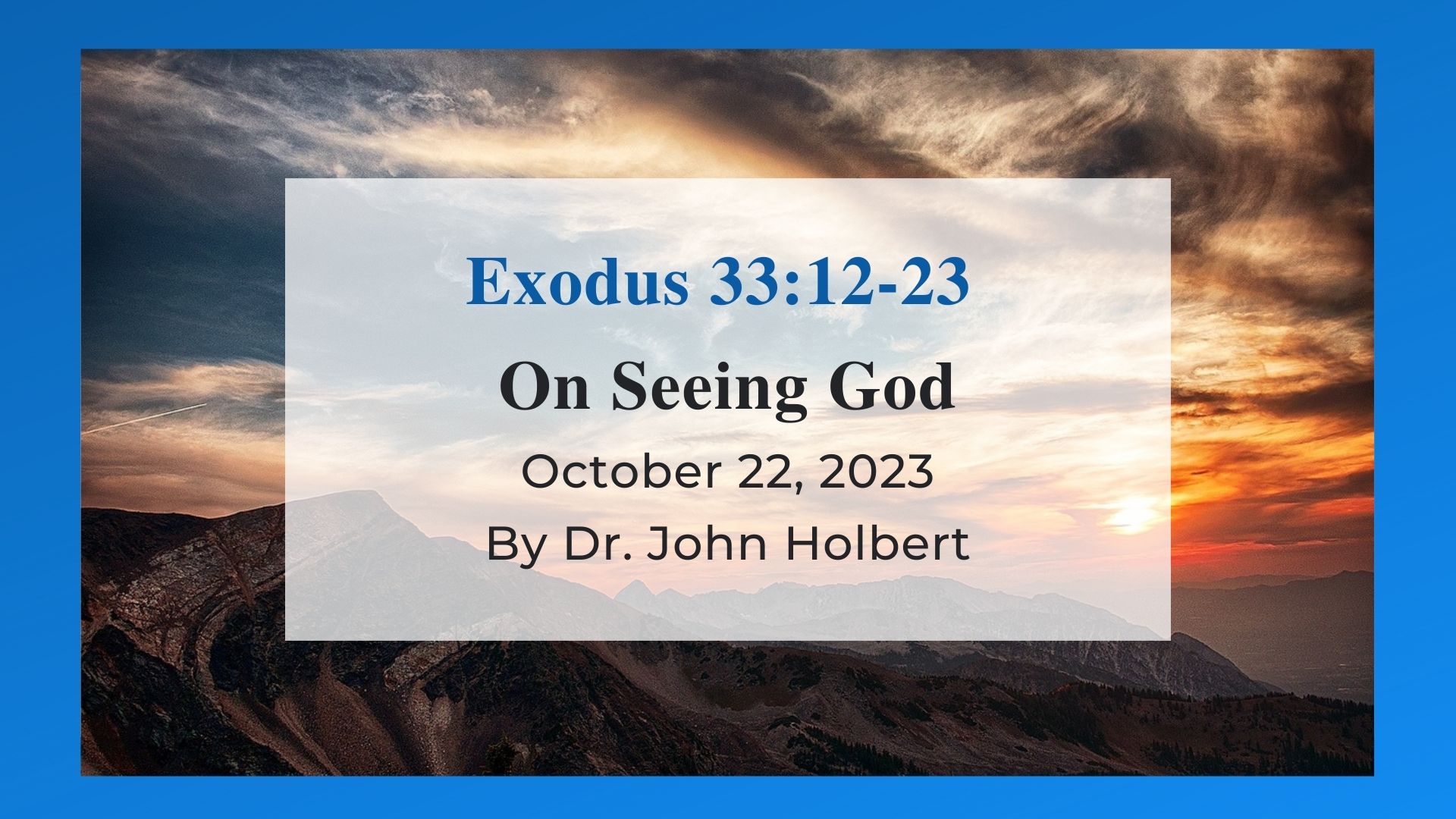On Seeing God - Reflections on Exodus 33:12-23
by Dr. John Holbert on Monday, October 16, 2023

On Seeing God
Exodus 33:12-23
The Peripatetic Hebrew Bible Preacher
With this text from Exodus today the lectionary compilers conclude our look at this central text for Hebrew theology. Through 9 texts from the book, we have attempted to grasp several of the key components of just how ancient Israel conceived of YHWH, the God of the people of Israel. In this final episode, the question of a human conception of God is raised forcefully, and at the same time with traditional Hebrew delight.
In the backdrop of the incident of the molten calf, and Moses’s vain attempt to assuage the fury of YHWH that resulted from that odious object, Moses pushes God to reveal more and more of the divine reality. He says, twice, that if he really has found favor in YHWH’s eyes, and if he really is known by name by YHWH, then YHWH needs to come forth more clearly to him and to the people if they are to feel fully secure as they travel toward the land of promise. The text is artfully constructed to suggest an at-first gentle shove from Moses to urge YHWH to show more and more of the divine self. “You have not made known to me whom you will send with me,” he says, responding to YHWH’s warning that if God were to travel with this recalcitrant and sinning people, “I would put an end to you” (Ex.33:5). In other words, the rage engendered in YHWH by the folly of the molten calf has hardly been tamped down, and if that furious YHWH were to appear directly in their midst, they would be doomed. Moses is not deterred by this raging YHWH, any more than he was in the previous chapter when he argued with YHWH about the divine plan to wipe Israel off the face of the earth (Ex.32:7-14), and thereby saved the people from divine wrath.
“So, show up, YHWH,” demands Moses, “or if you refuse yourself to show up, then tell me whom you plan to send with us.” Moses here becomes bold indeed in the face of YHWH, but remains rather polite, however demanding the words may sound. YHWH’s reply is laconic and mysterious, perhaps another divine dodge rather like the one at the bush when responding to Moses’ request for the name of YHWH (Ex.3:14). “My presence (“face”) will go, and I will give you rest” (Ex.33:14). Four words in Hebrew, but so cryptic as to be not at all satisfactory for the probing Moses, who is plainly not satisfied. “If your presence does not go (though YHWH has just said that the presence WILL go), do not take us up from here. How will it then be known that I have found favor in your eyes, I and your people (remember how YHWH claimed that they were in fact “your/Moses’” people in the midst of the divine temper on Horeb—EX.32:7)? Will it not be by your going with us, that I and your people may be shown special from every people on the face of the whole earth” (Ex.33:16)?
YHWH again slightly dodges the demand by saying, “This thing too that you have spoken, I will do” (Ex.33:17). What exactly is this “thing,” the most vague term one might choose? Whatever YHWH means by it, Moses hears it as an opening to raise the issue he has most clearly in mind. He demands with ultimate boldness, “Show me your glory” (Ex.33:18)! What Moses is asking may even be beyond what he himself imagines. The word “glory” may be heard in any one of many ways: glory, honor, divine presence, or its most literal meaning, weightiness. Whatever connotation the word may carry here, Moses’ demand is an indication that he is ready to move beyond the rather cloudy epiphany that he received at the flaming bush; he now wants the full manifestation of his God, a clear look at the character of the divinity that up to now has hidden in bush and cloud and fire. What he desires, to put it in modern terms is “the full Monty” of God!
The text here is about as anthropomorphic as the Bible becomes. God first admonishes Moses by exclaiming, “You shall not see my face, for no human (even you!) can see my face and live” (Ex.33:20). YHWH continues by urging Moses to move toward a crag in the mountain where YHWH will “shield” him with the palm of YHWH’s hand ( a most physical God indeed!), while YHWH passes by. After YHWH has passed by, the divine palm will be removed and Moses will see “YHWH’s back,” but never YHWH’s face (Ex.33:22-23).
Well, just what of God can we see in the end? Two aspects are offered to us in this remarkable text. First, at Ex.33:19, instead of the requested “glory,” YHWH will show divine “goodness,” employing the very simple noun tob. This implies that we may grasp the ethical dimension of God’s desires for us, the fuller weight of what the Torah may ultimately call from us, the Ten Commandments among other divine decrees. Second, we may view the afterglow of YHWH’s presence, the “after” of God’s passing; perhaps the word “wake” might be used. To search for the glory of God, the face of God, is futile, and may serve only to distract us from the more important aspects of God. What God demands of us ethically, and how God leads and guides us in our search for those actions are what we may learn from this text. They are very good and important lessons indeed. Worship, in the light of this text, may be less about basking in God’s glory than in hearing and doing what God asks of us. The fuller praise of God is to hear God clearly, to know that God goes with us, and to do what God demands.
